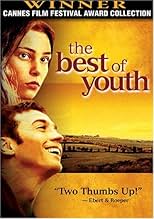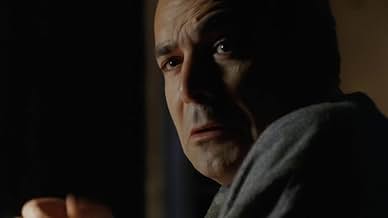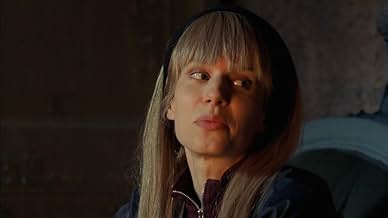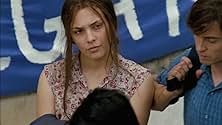Épopée italienne qui suit la vie de deux frères des années 60 à l'an 2000.Épopée italienne qui suit la vie de deux frères des années 60 à l'an 2000.Épopée italienne qui suit la vie de deux frères des années 60 à l'an 2000.
- Réalisation
- Scénario
- Casting principal
- Récompenses
- 33 victoires et 25 nominations au total
Avis à la une
I waste a lot of time reviewing cute but rubbishy science fiction and horror films on this site. I'm a bit out of practice with watching, and critiquing, actual drama! But of course, I still realize that the key to great drama is the characters - and they make this epic Italian miniseries-turned-movie work, and work beautifully at that.
"The Best of Youth" focuses on various members of the Carati family and their friends, advancing from the 1960s to the near-present as it chronicles their lives in the context of social turmoil in Italy as a whole. For the most part, the story never drags, and every single character is compelling and sympathetic.
Many of the character have flaws, but they're not bad people - just complex. Many tragic things happen, but the film never wallows in misery, except on one wholly justified occasion. Moral conflicts are explored not in black-and-white, but in shades of grey. In other words, "The Best of Youth" is rich with the kind of warmth, complexity and subtle nuances that you tend to miss in most American dramas - even the ones that win Oscars.
I won't spoil the plot, really - I'll just say that both of the main characters, brothers Matteo and Nicola Carati, are charismatic and cool and well worth six hours of screen time. They're also very different, which keeps things interesting.
Are there any significant flaws here? Nah, not really. My interest waned a bit during some segments, particularly the historical ones that aren't explained that well. There's also a bit of cheesy makeup and blue screen, but that can be excused because this is really a TV production, as I understand it, not a big movie. Besides, I sort of love production flaws. They're fun, aren't they?
On a totally pointless note, I'd like to mention a strange plus of "The Best of Youth" - much of the cast is totally gorgeous. Guys and gals alike have reason to rejoice here...
One final random thought. While I'm glad that "The Best of Youth" was distributed and well-received in the U.S., I'm annoyed that it was publicized as being "like the Godfather" or "like the works of Scorcese." It's nothing like the Godfather, it's nothing like Scorcese. The marketers seemed to have believed, unfortunately, that U.S. audiences are only interested in Italian criminals, not normal Italian people. This sort of irritates me. (Note my surname and you'll figure out why!) But such concerns have nothing to do with the actual movie, which is pretty much flawless.
"The Best of Youth" focuses on various members of the Carati family and their friends, advancing from the 1960s to the near-present as it chronicles their lives in the context of social turmoil in Italy as a whole. For the most part, the story never drags, and every single character is compelling and sympathetic.
Many of the character have flaws, but they're not bad people - just complex. Many tragic things happen, but the film never wallows in misery, except on one wholly justified occasion. Moral conflicts are explored not in black-and-white, but in shades of grey. In other words, "The Best of Youth" is rich with the kind of warmth, complexity and subtle nuances that you tend to miss in most American dramas - even the ones that win Oscars.
I won't spoil the plot, really - I'll just say that both of the main characters, brothers Matteo and Nicola Carati, are charismatic and cool and well worth six hours of screen time. They're also very different, which keeps things interesting.
Are there any significant flaws here? Nah, not really. My interest waned a bit during some segments, particularly the historical ones that aren't explained that well. There's also a bit of cheesy makeup and blue screen, but that can be excused because this is really a TV production, as I understand it, not a big movie. Besides, I sort of love production flaws. They're fun, aren't they?
On a totally pointless note, I'd like to mention a strange plus of "The Best of Youth" - much of the cast is totally gorgeous. Guys and gals alike have reason to rejoice here...
One final random thought. While I'm glad that "The Best of Youth" was distributed and well-received in the U.S., I'm annoyed that it was publicized as being "like the Godfather" or "like the works of Scorcese." It's nothing like the Godfather, it's nothing like Scorcese. The marketers seemed to have believed, unfortunately, that U.S. audiences are only interested in Italian criminals, not normal Italian people. This sort of irritates me. (Note my surname and you'll figure out why!) But such concerns have nothing to do with the actual movie, which is pretty much flawless.
It's hard not to feel like an "easy" grader to give this film a 10, given that it is the very simple story of a family over 4 decades, no quirky writing or the eccentricities of "indie" films - just beautiful scenery, characters that move us and that we care about, and a sweet and believable story. The acting is excellent.
To say this is a miniseries is misleading and adds the impression of a "cheese" factor that is not present. There is a reason that this film has been taken from the small screen and released in theaters - I didn't even know it had been a miniseries until I read some of the comments here.
The story is simple but it is not trite; we may not have a huge number of surprises and no amazing plot twists and contortions but it is an emotional, moving, satisfying story.
The most moving part of the story is the love and connectedness between the characters, and how this is expressed - here in the U.S. physical display of platonic affection is virtually non-existent, unless you count athletes hitting each other on the rear. You can tell these characters really care for each other.
I sat for the second three hours today with people who sat through the first three hours with me yesterday. Some yesterday just got back in line for part 2. There was a line waiting to get in today - all people who had seen part 1 already.
Saying this movie is like Zelig as someone here did is false and insulting. We couldn't tell a story about a U.S. family that spans the 60's to the present without mentioning Viet Nam or Watergate or 9/11, so this story of course mentions events internal to Italy during that time. The historical events are a backdrop to the story, not the story itself.
The story is about this family, and we care about what happens to them. We become engaged, we sit and watch and laugh and cry with them. That's what movies are supposed to do.
To say this is a miniseries is misleading and adds the impression of a "cheese" factor that is not present. There is a reason that this film has been taken from the small screen and released in theaters - I didn't even know it had been a miniseries until I read some of the comments here.
The story is simple but it is not trite; we may not have a huge number of surprises and no amazing plot twists and contortions but it is an emotional, moving, satisfying story.
The most moving part of the story is the love and connectedness between the characters, and how this is expressed - here in the U.S. physical display of platonic affection is virtually non-existent, unless you count athletes hitting each other on the rear. You can tell these characters really care for each other.
I sat for the second three hours today with people who sat through the first three hours with me yesterday. Some yesterday just got back in line for part 2. There was a line waiting to get in today - all people who had seen part 1 already.
Saying this movie is like Zelig as someone here did is false and insulting. We couldn't tell a story about a U.S. family that spans the 60's to the present without mentioning Viet Nam or Watergate or 9/11, so this story of course mentions events internal to Italy during that time. The historical events are a backdrop to the story, not the story itself.
The story is about this family, and we care about what happens to them. We become engaged, we sit and watch and laugh and cry with them. That's what movies are supposed to do.
"There is, nevertheless, a certain respect and a general duty of humanity that ties us, not only to beasts that have life and sense, but even to trees and plants." Montaigne
Rarely does a new film find a place on a longstanding short list of best ever. The Italian import Best of Youth recently entered my all time best ten, a singular honor considering I had to sit still for six hours of viewing, and I rarely sit still anytime, even if my name is DeSando and it's a family saga.
Director Francis Ford Coppola created a movie empire with his Godfather series and ended up with what some consider the best American movie ever made. It is unforgettable for its emphasis on family values mafia style and its stunning photography. The Best of Youth is decidedly not mafia related; rather it is a romantic and historical rendering of Italy from the 1960's as seen through the lives of the Carati family and their friends and lovers. The two brothers, Nicola and Matteo, represent the Janus-like conflict of liberal and conservative in the volatile last half-century of Italian social and cultural change.
This is humanistic history at its best as director Marco Tullio Giordana takes us through the sexy seventies, a devastating Florence flood, the emergence of Red Brigades, assassinations and business downturns including the Fiat layoffs. Despite deaths, suicide, and disappointment, the last line of the film, spoken in the new century, repeats the sentiment of the youthful days in the last century that everything is truly beautiful. How can you miss that theme when the cinematography emphasizes the antique charm of Italy and the close up beauty of actors who look their parts, albeit rarely ugly? The film, often tightly framed, accentuates character over plot and a certain imprisonment in character and destiny. The choice of actors is nothing short of inspired.
The genius of Best of Youth is that like Italy itself, this family is a stew of ideologies that offers up dignity of the individual as the highest value and respect (remember The Godfather) for humanity the only arbiter of peace. This film stands with Brokeback Mountain and The New World as a towering achievement and testimony to the transcending power of art to make us look at ourselves as vulnerable and beautiful.
Rarely does a new film find a place on a longstanding short list of best ever. The Italian import Best of Youth recently entered my all time best ten, a singular honor considering I had to sit still for six hours of viewing, and I rarely sit still anytime, even if my name is DeSando and it's a family saga.
Director Francis Ford Coppola created a movie empire with his Godfather series and ended up with what some consider the best American movie ever made. It is unforgettable for its emphasis on family values mafia style and its stunning photography. The Best of Youth is decidedly not mafia related; rather it is a romantic and historical rendering of Italy from the 1960's as seen through the lives of the Carati family and their friends and lovers. The two brothers, Nicola and Matteo, represent the Janus-like conflict of liberal and conservative in the volatile last half-century of Italian social and cultural change.
This is humanistic history at its best as director Marco Tullio Giordana takes us through the sexy seventies, a devastating Florence flood, the emergence of Red Brigades, assassinations and business downturns including the Fiat layoffs. Despite deaths, suicide, and disappointment, the last line of the film, spoken in the new century, repeats the sentiment of the youthful days in the last century that everything is truly beautiful. How can you miss that theme when the cinematography emphasizes the antique charm of Italy and the close up beauty of actors who look their parts, albeit rarely ugly? The film, often tightly framed, accentuates character over plot and a certain imprisonment in character and destiny. The choice of actors is nothing short of inspired.
The genius of Best of Youth is that like Italy itself, this family is a stew of ideologies that offers up dignity of the individual as the highest value and respect (remember The Godfather) for humanity the only arbiter of peace. This film stands with Brokeback Mountain and The New World as a towering achievement and testimony to the transcending power of art to make us look at ourselves as vulnerable and beautiful.
10Peegee-3
Can art transform life? If so, I would elect "The Best of Youth" as a primary candidate for that possibility.
Almost never in my over 60 years of film viewing have I been as deeply affected, haunted by characterizations, poetic dialog and brilliantly unexpected turns...and breadth of scope. The nuances of relationship between people...in this case the Italian family Carati, their lovers, friends, wards...are so moving, so deeply portrayed and inhabited by the actors that I was not only moved to tears, but inspired. Here is a view of how human beings can live the humanity so desperately needed in this crazed and warring world...also presented as an integral part of plot and interaction...and this done without any sort of didactic or polemic foisting...All achieved through the intimate and profound struggles of the film's characters.
Imagination and the incredible sensibility of director (Marco Tullio Giordana),writers (Petraglia and Rulli) and actors (most outstanding: Luigi LoCacio, Alessio Boni, Adriana Asti and Jasmine Trinca) combine to offer a film that carried this participant (for that's what I felt) into a realm only experienced by exceptional literature.
As is obvious...I highly recommend seeing this movie.
Almost never in my over 60 years of film viewing have I been as deeply affected, haunted by characterizations, poetic dialog and brilliantly unexpected turns...and breadth of scope. The nuances of relationship between people...in this case the Italian family Carati, their lovers, friends, wards...are so moving, so deeply portrayed and inhabited by the actors that I was not only moved to tears, but inspired. Here is a view of how human beings can live the humanity so desperately needed in this crazed and warring world...also presented as an integral part of plot and interaction...and this done without any sort of didactic or polemic foisting...All achieved through the intimate and profound struggles of the film's characters.
Imagination and the incredible sensibility of director (Marco Tullio Giordana),writers (Petraglia and Rulli) and actors (most outstanding: Luigi LoCacio, Alessio Boni, Adriana Asti and Jasmine Trinca) combine to offer a film that carried this participant (for that's what I felt) into a realm only experienced by exceptional literature.
As is obvious...I highly recommend seeing this movie.
The Best of Youth is a wonderfully scripted, acted, and visually stunning film that will sweep you off your feet and into the lives of an Italian family as they go through the trials and tribulations of life. The film's main focus is on two brothers, Nicola and Matteo Catiti whose personalities are as different as night and day yet is also immediately apparent that these two love each other very much. Nicola is the younger, free spirited and philosophical brother while Matteo is more outspoken, with a hot temper and closed personality.
What I admired most throughout this film was the use and passage of time. Events in Italian history are not crammed into 120 minutes but is instead elongated, as Matteo and Nicola react in their own ways to the events that occur in their country. Time is such an important factor in this film, evidents not only by the six hour running time, but how those six hours are treated. Special occasions occur, yet none are given any special attention. The events that occur are important for that moment in time, yet one pass become mere memories such is the case of life.
With the passage of time, The Best Of Youth became such a moving experience for me. I felt as if I were a part of their family. I could not touch them, or talk to them, yet they seemed to welcome me with open arms as I silently watched their lives unfold before me. I could feel the love this family had for each other as I laughed and cried right beside them. Words just do not seem to be enough to describe the brilliance of this film. It is literally life transferred on screen.
The Best of Youth is remarkably acted and directed. At no time during this film was I bored, because such attention is made to character development, script, and cinematography. In the first part of the film, Nicola is exploring Norway, and sends a postcard to his brother back home telling him of his travels and experiences, and in three words, seems to sum up the film perfectly: "Life is beautiful." After viewing this film, you will share the same perspective.
HIGHLY Recommended
What I admired most throughout this film was the use and passage of time. Events in Italian history are not crammed into 120 minutes but is instead elongated, as Matteo and Nicola react in their own ways to the events that occur in their country. Time is such an important factor in this film, evidents not only by the six hour running time, but how those six hours are treated. Special occasions occur, yet none are given any special attention. The events that occur are important for that moment in time, yet one pass become mere memories such is the case of life.
With the passage of time, The Best Of Youth became such a moving experience for me. I felt as if I were a part of their family. I could not touch them, or talk to them, yet they seemed to welcome me with open arms as I silently watched their lives unfold before me. I could feel the love this family had for each other as I laughed and cried right beside them. Words just do not seem to be enough to describe the brilliance of this film. It is literally life transferred on screen.
The Best of Youth is remarkably acted and directed. At no time during this film was I bored, because such attention is made to character development, script, and cinematography. In the first part of the film, Nicola is exploring Norway, and sends a postcard to his brother back home telling him of his travels and experiences, and in three words, seems to sum up the film perfectly: "Life is beautiful." After viewing this film, you will share the same perspective.
HIGHLY Recommended
Le saviez-vous
- AnecdotesOriginally developed as a miniseries for television. It was then released in cinemas in June 2003 as two three-hour films after the uncut six-hour version had been screened to great acclaim at the Cannes Film Festival. It was eventually aired on Italian TV as originally intended, in 4 parts, in November 2003.
- Gaffes(at around 27 mins) After a caption has shown that the film is set in 1966 at the beginning and the main characters are getting into a car, a radio is heard playing the song "Might just take your life" by Deep Purple. This song was released in 1974.
- Citations
Sara Carati, adult: What should I do?
Nicola Carati: I don't know, it depends on how strong you feel... Are you happy now?
Sara Carati, adult: Of course I am!
Nicola Carati: Then, it's time to be generous
- ConnexionsEdited into Colpiti al cuore (2019)
Meilleurs choix
Connectez-vous pour évaluer et suivre la liste de favoris afin de recevoir des recommandations personnalisées
- How long is The Best of Youth?Alimenté par Alexa
Détails
- Date de sortie
- Pays d’origine
- Sites officiels
- Langues
- Aussi connu sous le nom de
- The Best of Youth
- Lieux de tournage
- Sociétés de production
- Voir plus de crédits d'entreprise sur IMDbPro
Box-office
- Montant brut aux États-Unis et au Canada
- 274 024 $US
- Week-end de sortie aux États-Unis et au Canada
- 7 490 $US
- 6 mars 2005
- Montant brut mondial
- 2 799 773 $US
- Durée
- 6h 14min(374 min)
- Couleur
- Mixage
- Rapport de forme
- 1.85 : 1
Contribuer à cette page
Suggérer une modification ou ajouter du contenu manquant
































